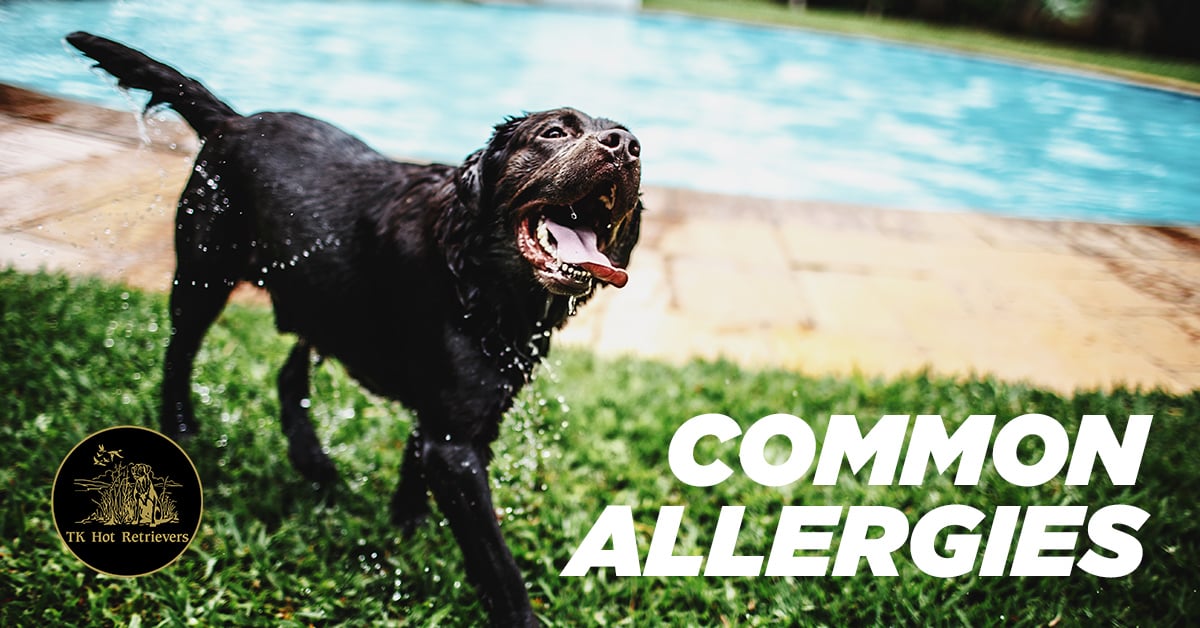Common Allergies in Labs

One thing we love about our pooches is how unique they are, no matter their breed, age, or gender – your furry friend has their personality and habits. Another thing that’s unique in dogs is their allergies – some have severe reactions to different foods, and others react stronger to bacteria than others. Here are some of the most common allergies some canines may have or develop.
Fido’s Food Allergies
There is an abundance of food items we eat every day that some pups are incredibly allergic to while others are not; here are a few.
The Most Common Food Allergies in Labs
- Beef
- Corn
- Soy
- Fish
- Wheat
- Chicken
- Chicken Eggs
Dogs who are allergic to certain food products may become itchy, lose hair, get an ear infection, begin having overly-frequent “potty breaks,” and acquire skin infections after consuming that food.
How to Handle a Food Allergy in Your Lab
Figuring out what your food your dog is allergic to is the first step to relieving their allergy. Once you know what causes them irritation, you can start to purchase food that excludes their allergens or buy hypoallergenic formulas. When switching your pups food though, it’s important to slowly wean them off their old food as you transition into the new one to not give your canine an upset stomach.
Fur-ightening Flea Allergies
Flea allergies are one of the most popular allergies vets treat in dogs. Fleas thrive in the summer and warmer months, so that’s when you need to be the most cautious when it comes to Fido’s health. Flea allergies will cause your pup to itch and itch and itch until their skin may turn rews, inflamed, and patchy. The most common places you’ll find flea bites are on the back and base of your pup’s tail.
How to Avoid and Treat Flea Allergies
Taking preventative measures is the best way to handle fleas.
- Grooming your pup regularly can prevent an abundance of flea bites.
- Keeping your floors swept and vacuumed regularly, along with any furniture will also help eliminate fleas from infesting your home and not only attacking your furry friend but you as well.
- Also investing in flea medicine can help
If things do get out of control though you can always consult your vet for over the counter flea medicine or treatments.
Contact Allergies for Canines
Contact allergies are when your Lab develops a reaction to substances in the environment.
Common Contact Allergies in Labs
- Dyes
- Carpet deodorizes
- Antibiotics
- Rubber
- Wool
- Metals like nickel
- Poison ivy sap
- Salt used for icy roads
These allergies usually occur in areas of your pooch that have little to no fur, such as their paws, muzzle, and lower abdomen. If an irritable substance comes in contact with one of these areas you’ll notice it turning red and small bumps or blisters appearing.
Contact allergies are best determined by going to your vet and haveing an allergin test done on your Lab. Once you know what your furry friend is allergic to you can try to either use medication or remove/keep the substance away from your pup as much as possible. Hypoallergenic shampoo can also help if your pooch has severely sensitive skin.
Inhalant Allergies That’ll Irritate Your Pup
Inhalant allergies are the second most popular allergy in Labs and are caused by airborne or inhaled allergins.
The Most Common Inhalant Allergies in Your Lab
- Mold
- Dust
- Pollen
Dogs with inhalant allergies will usually scratch their legs, face, ears, groin, and armpit areas at an alarming amount. If this does occur, your vet will perform some tests on your pooch and either give them shots or a prescription drug to keep their symptoms at bay.
Bark-Worthy Bacterial Allergies
Bacterial allergies occur due to the reactions all of these other allergins create. Due to skin irritation and hair loss, your Lab can develop lesions. If this happens, your vet will probably prescribe a topical cream or spray to treat the infected area.
Just like us, dogs have numerous allergies – the best way to deal with them is to be observant, notice when something is off with your dog, and bring it up with your vet so your Lab can stay happy and healthy.